Congress can’t stop the CIA from working with forces that commit abuses

For more than two decades, the U.S. military has been barred from providing training and equipment to foreign security forces that commit “gross violations of internationally recognized human rights.”
The law, named for its author, Vermont Sen. Patrick Leahy, applies to military assistance for foreign units funded through the Defense or State departments. Lawmakers including Leahy, a Democrat, acknowledged that it does not cover commando outfits like Afghanistan’s Zero Units.
In an email, Leahy said he believes that the law’s human rights requirements need to be expanded to “cover certain counter-terrorism operations involving U.S. special forces and foreign partners.
“U.S. support for foreign security forces, whether through the Department of Defense, Department of State, CIA or other agencies,” Leahy wrote, “must be subject to effective congressional oversight so when mistakes are made or crimes committed, those responsible are held accountable.”
Leahy called on the Biden administration to apply the law “as a matter of policy” to all overseas military forces that work with any U.S. government agencies.
Tim Rieser, an aide to Leahy, acknowledged that the Leahy Law “is not all-encompassing, as much as we wish it were.” The Leahy Law, he said, applies only to congressional appropriations that fund the State and Defense departments.
“Sen. Leahy’s position has always been that the policy should be consistent, that we should not support units of foreign security forces that commit gross violations of human rights regardless of the source of the funds, but that is not what the law says.”
A source familiar with the Zero Unit program said the CIA’s officers in the field, and special forces soldiers working under their direction, are required to follow the same rules of combat as American service members. The agency does not fall under the Leahy Law.
U.S. military operations fall under the jurisdiction of the Senate and House Armed Services committees. Congressional oversight of the CIA and other intelligence agencies is handled by separate committees in the House and Senate that hold most of their meetings and hearings in secret. By law, the agencies are required to keep Congress “fully and currently informed” of all covert operations. Intelligence committee staffers have the authority to ask the CIA for documents and testimony about classified missions like the support for the Zero Units under the broad national security law known as Title 50.
Congressional officials said the two oversight committees are ill-equipped to monitor the complexities of paramilitary operations in foreign countries. The Pentagon and State Department have created entire bureaucracies to make sure foreign units meet the requirements of the Leahy Law. The intelligence oversight committees, with their relatively small staffs, are not set up to track what’s happening on the ground when U.S. military officers on loan to the CIA work with elite units in the hinterlands of Afghanistan, Somalia or Syria.
“The sense I get from former operators is they don’t give a shit,” said one congressional source. “Their attitude is, the world’s dangerous and you partner with bad people, that’s why we have Title 50.”
Congressional staffers said they believed the failure of Congress to extend the Leahy Law to intelligence agencies was no coincidence.
“I mean, it’s a huge and intentional gap,” one said. “It’s designed to not have oversight; it is meant to not be under the public view.”
In his email, Leahy said an amendment to the Leahy Law, which would expand the scope to certain counter-terrorism operations, is now in the works.
The lack of consequences for blatant human rights violations, he said, “foments anger and resentment toward the U.S., undermines our mission in these countries where we need the support of the local population, and weakens our credibility as a country that supports the rule of law and accountability.”

